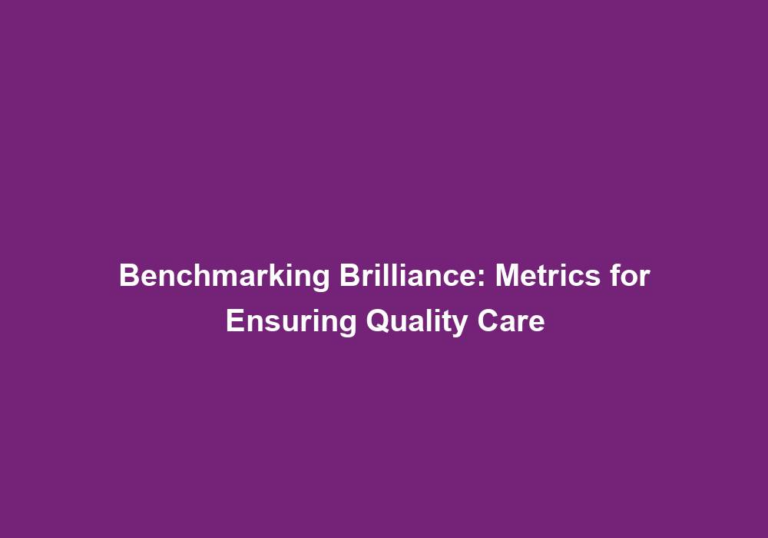Clinic Cents: Mastering Financial Management in Healthcare
In the healthcare industry, effective financial management plays a crucial role in the success and sustainability of clinics and healthcare facilities. By mastering financial management, healthcare professionals can ensure the efficient allocation of resources, maintain financial stability, and provide quality patient care. This article aims to provide valuable insights into the key aspects of financial management in healthcare, offering guidance and strategies for healthcare professionals to navigate the complex financial landscape.
Understanding the Importance of Financial Management in Healthcare
Financial management in healthcare involves the strategic planning, organization, and control of financial resources within a healthcare organization. It encompasses various activities, including budgeting, financial analysis, revenue and expense management, billing, and compliance with regulatory requirements. By effectively managing finances, healthcare facilities can optimize their operations, make informed decisions, and improve patient outcomes.
To truly understand the importance of financial management in healthcare, it is essential to delve into the different aspects that make it crucial:
-
Budgeting and Financial Planning: Creating a comprehensive budget and financial plan is the foundation of effective financial management in healthcare. It involves forecasting revenue and expenses, setting financial goals, and developing strategies to achieve them. A well-designed budget enables healthcare professionals to allocate resources efficiently, monitor financial performance, and identify areas for improvement. By having a clear financial plan, clinics can better manage their resources and ensure financial stability.
-
Revenue Cycle Management: Efficient revenue cycle management (RCM) is vital for healthcare facilities to maintain financial stability. It encompasses the entire patient billing process, from scheduling appointments to collecting payments. By streamlining RCM processes, clinics can optimize revenue collection, reduce billing errors, and enhance cash flow. This includes implementing strategies such as accurate coding, timely claims submission, and prompt follow-up on unpaid claims.
-
Cost Control and Expense Management: Controlling costs and managing expenses are critical components of financial management in healthcare. Healthcare professionals must closely monitor expenses, negotiate contracts with vendors, and identify opportunities for cost-saving without compromising patient care quality. Implementing cost-effective strategies, such as utilizing technology and optimizing supply chain management, can significantly contribute to financial sustainability. This includes exploring options for bulk purchasing, evaluating contracts regularly, and implementing energy-saving initiatives.
-
Financial Analysis and Reporting: Regular financial analysis and reporting provide healthcare professionals with valuable insights into the financial health of their organization. By analyzing financial data, clinics can identify trends, track performance indicators, and make data-driven decisions. Accurate and timely financial reporting is also essential for compliance with regulatory requirements. This includes generating financial statements, conducting variance analysis, and preparing reports for internal and external stakeholders.
Strategies for Effective Financial Management in Healthcare
To master financial management in healthcare, healthcare professionals can implement the following strategies:
-
Invest in Financial Management Training: Continual learning and professional development in financial management are crucial for healthcare professionals. By investing in training programs and workshops, clinicians and administrators can gain the necessary knowledge and skills to effectively manage finances within a healthcare setting. This includes attending seminars on healthcare finance, pursuing certifications in financial management, and staying updated with industry best practices.
-
Utilize Technology Solutions: Leveraging technology solutions, such as advanced financial management software and electronic health record systems, can streamline financial processes, improve accuracy, and enhance efficiency. Automation of tasks like billing, claims processing, and financial reporting can save time and resources, allowing healthcare professionals to focus on delivering quality patient care. This includes implementing integrated systems that facilitate seamless data sharing, utilizing predictive analytics for revenue forecasting, and adopting electronic payment solutions.
-
Collaborate with Financial Experts: Collaborating with financial experts, such as accountants and financial advisors, can provide valuable insights and guidance in managing healthcare finances. These professionals can offer expertise in areas such as tax planning, financial analysis, and investment strategies, ensuring the financial stability and growth of healthcare organizations. This includes seeking advice on tax-efficient investment vehicles, consulting professionals for financial audits, and conducting regular financial health check-ups.
-
Monitor Key Performance Indicators: Monitoring key performance indicators (KPIs) is essential for assessing the financial performance of healthcare facilities. KPIs such as revenue per patient, average collection time, and operating margin can provide valuable insights into the financial health and efficiency of clinics. Regularly tracking and analyzing these KPIs can help identify areas for improvement and guide financial decision-making. This includes setting benchmarks for financial performance, conducting ongoing analysis of KPI trends, and implementing corrective measures when necessary.
-
Emphasize Compliance and Documentation: Compliance with regulatory requirements and proper documentation are crucial aspects of financial management in healthcare. Healthcare professionals must stay up-to-date with changing regulations and ensure accurate record-keeping to avoid penalties and maintain financial integrity. Implementing robust compliance and documentation processes is essential to protect the financial well-being of clinics. This includes conducting regular audits to ensure adherence to regulatory standards, implementing internal controls for financial transactions, and preserving documentation for billing and reimbursement purposes.
Conclusion
Mastering financial management in healthcare is essential for clinics and healthcare facilities to thrive in a dynamic and challenging industry. By implementing effective strategies, healthcare professionals can optimize resource allocation, maintain financial stability, and deliver quality patient care. Continuous learning, utilization of technology solutions, collaboration with financial experts, and diligent monitoring of key performance indicators are key to achieving success in financial management within the healthcare sector. It is through these efforts that healthcare organizations can navigate the complex financial landscape and ensure long-term sustainability.







